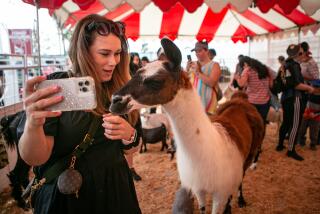Block Urges Halt to Lottery Plans for Video Keno Games : Gambling: The state hopes to stimulate sagging sales. The sheriff says terminals will cause loitering.
- Share via
Sheriff Sherman Block on Wednesday urged reconsideration of a California Lottery plan to offer keno games on video terminals at sales outlets throughout the state, saying that the games could lead to loitering at liquor and convenience stores and cause law enforcement problems.
Block said he has been informed that lottery officials plan to offer the games beginning next month, as part of an effort to increase severely depressed lottery sales. He said he was told that the games would be offered every day from 6 a.m. to 11 p.m., with a new game appearing as often as every five minutes.
In a letter to Gov. Pete Wilson, Block called the plan “terribly flawed” and contended that the frequency of games “will cause people to loiter around the game locations to await results and to continue playing.”
“In addition, I find it unconscionable that during a period of recession the state of California would exploit its citizens by creating new schemes to take more money out of their pockets,” the sheriff told the governor.
However, California Lottery officials, who have quietly been advising law enforcement groups about keno, said Block had misunderstood the plans and mistakenly envisioned the games as similar to those that draw hordes of teen-agers to video arcades.
Joanne McNabb, the lottery’s public affairs director, said lottery terminals will be used in the same way they are used for the Super Lotto game--to print tickets. She said television monitors will be installed in some retail outlets but only to provide game information.
In the games that are planned, players would select 10 numbers out of 80, after which the lottery would post 20 winning numbers. Those who have chosen all or a large proportion of the 20 numbers would get cash prizes, much like the keno played in Nevada.
McNabb declined to release many details about the new games other than to say they would go into effect by the end of the year and change every five minutes. She said the games are a key part of the lottery’s strategy to increase revenues and are expected to produce $600 million in sales in the first year.
McNabb said the keno games are patterned after similar games in Oregon, a state that she said has reported no increased law enforcement problems as a result.
Block however, was not alone Wednesday in his concern about the keno games. Others in the law enforcement community, including the California Police Chiefs Assn. and the California State Sheriffs’ Assn., said they were opposed to them. Block said he is contacting every mayor and police chief in Los Angeles County to enlist their help in opposing the keno program.
Humboldt County Sheriff David A. Renner, immediate past president of the sheriff’s association, said his group is concerned that in California--unlike Oregon--the games would be played primarily in convenience stores. He said that in Oregon, keno is played primarily in bars and restaurants, where people sit down for extended periods.
With new games every five minutes, he said, “what we perceive is the congregation of players in convenience stores where they are not physically capable of handling small, medium or large-size crowds.”
Renner said law enforcement officials expect that players will tend to gather in parking lots and on street corners, where it is more likely that they will create disturbances.
“We perceive a significant increased burden on law enforcement,” he said.
Renner said the association has advised the governor of its concerns, but McNabb said the governor’s office has assured the lottery that it has no problem with keno.
She said Renner was incorrect--that the game is also played in Oregon’s convenience stores. She said about two-thirds of the Oregon players buy only one draw “and then leave and go home.”
The widespread playing of keno also could have a significant impact on the future of gambling halls on California’s Indian reservations, which for several years have sought the right to add slot machine and other lucrative casino games.
Citing a federal law that authorizes Indian reservations to offer any type of wagering that is legal in their states, more than two dozen California tribes have filed applications with Sacramento for “compacts” sanctioning the use of slot machines, blackjack and roulette in addition to the gambling currently approved: bingo, off-track betting and poker.
Fifteen of the tribes have pending litigation challenging the state’s refusal to agree to full casino gambling on Indian lands.
Times staff writer Paul Lieberman contributed to this story.
More to Read
Sign up for Essential California
The most important California stories and recommendations in your inbox every morning.
You may occasionally receive promotional content from the Los Angeles Times.













